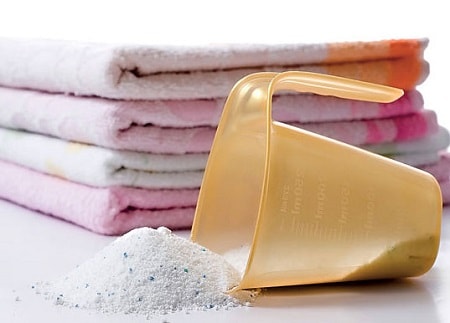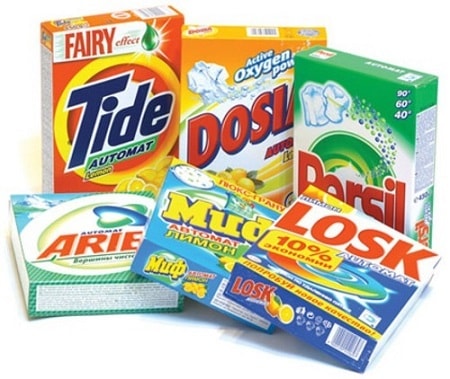What factor determines our choice when buying a washing powder? Personal experience, advice from friends, advertising? If the tool is a proven one that has long proven itself positively, then there are no questions. When discussing how to choose a washing powder, experts advise first of all to take into account the safety and quality of the product.
The main criteria for choosing a washing powder

Washing powder is 100% chemistry, so it is inherently anti-ecological. But modern man has so adapted to the overwhelming influence of chemicals in everyday life that we are only puzzled by the question of which of them is the least dangerous to health. Powders for washing machines must pass the certification procedure, as evidenced by a special badge on the packaging. But the presence of the badge does not guarantee the impossibility of forgery. You need to be careful when choosing detergents in economy class stores, where prices are below average market. Washing powder for automatic machines is often available in plastic bags of different sizes. It is easy to pack counterfeit products into such containers; it is difficult to identify a fake, so it is worth comparing the price and appearance of the powder in different stores and not to act according to the rule of "stingy pays twice."
An automatic powder that is safe for health is not necessarily the best in quality. These two criteria are not related. The choice of powder for a washing machine empirically is made by the buyer himself, using in turn several equally safe means. The primary choice is influenced by advertising, aggressively invading the minds of people. In practice, however, a little-known powder often cleans laundry better than the "hero" of an advertising story. Buyers choose a product not only by the main criteria - safety and quality, but also by subjective ones: economy, the scent they like, etc.
![]() See also - What are open panel dishwashers
See also - What are open panel dishwashers
Parsing powder by composition

All detergents are similar in composition. They contain:
- Surfactants. This is the base of the detergent.
- Bleaches. Chlorine bleach is harmful to health and destroys tissues, it is better to choose oxygen.
- Enzymes are dietary supplements that break down organic pollution. Active only at low water temperatures.
- Polymers are substances that prevent dirt particles from settling on washed laundry.
- Fragrances. Scented linen.
- Defoamers. Prevents the formation of copious foam, so as not to damage the mechanism of the washing machine.
- Softeners. Part of delicate washing powders. Prevents deformation of delicate fabrics.
Children's clothes are washed with special powders, which do not contain bleach, enzymes and other chemical compounds dangerous for the delicate skin of the child. There are detergents for certain types of fabrics, colored and white laundry, etc.
![]() See also - Where to put powder in the washing machine
See also - Where to put powder in the washing machine
Laboratory testing of washing powder

The quality of the powder for automatic washing machines is determined by the careful selection and combination of its constituent substances. It is important for the consumer that the information on the detergent packaging is correct. To make sure of this, manufacturers (less often consumers) order a test in independent laboratories.
If two powders are tested, the test wash is carried out simultaneously on two identical machines. The same amount of detergent is measured, two pieces of fabric identical in composition, size, shape and degree of contamination are placed in the drum of automatic machines. Moreover, contaminated samples are produced in a special way at European enterprises, since their Russian counterparts are not recognized at the world level. For the purity of the experiment, the contaminated samples are even placed in the drum of the machines in the same way. The time of starting, ending and all washing processes, the amount and temperature of water, the energy spent - all these indicators are carefully recorded by special devices. At the end of the wash, the samples are removed from automatic machines and tested on optical equipment: the technique determines the invisible differences in the color of the fabric.
![]() See also - How much powder should be poured into the washing machine
See also - How much powder should be poured into the washing machine
Powder: recommendations for selection
Detergents are chosen according to the types of washing machines, types of fabrics and the characteristics of the dirt on them. Information on the purpose of the powder is contained on the packaging.
Low foaming powders are used for automatic washing machines. On the packaging of the detergent there is the word "automatic", there is a round door or a drawing of a front-loading washing machine. Sometimes the prefix "matic" is indicated next to the name. In no case should you use powders for hand washing - they will damage the automatic machine.
The instructions for using the detergent tell you in detail how much powder is calculated for one wash. If too much detergent is added to the dispenser, copious foam will form, which is dangerous for automatic washing machines. When washing 2-3 items, use less powder.
Liquid detergent is limited to low temperatures.
If the wash program is running in cold water, less powder is used than usual: at low temperatures it does not dissolve well, which means that some of the product will be wasted.
Experts advise to dilute thick fabric softener with water so that it is consumed without residue during washing, without settling on the walls of the dispenser. Some powders are put directly into the drum of the washing machine, and not in a special container. By following these recommendations, consumers will be able to successfully choose and economically use detergents, as well as extend the life of their household appliances.
![]() See also - 10 best fabric conditioners
See also - 10 best fabric conditioners


Thanks for the article) I have been using WAVE washing sheets for a long time!)